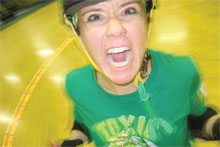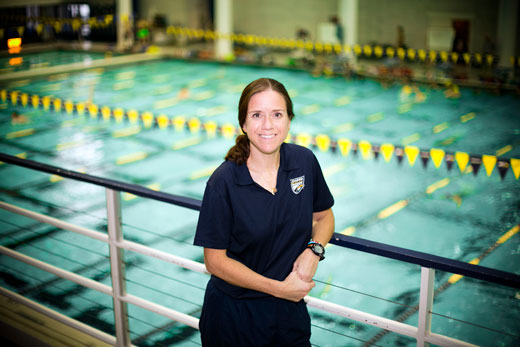Standing poolside at Emory's Madeleine Jude Brown Aquatic Center, Cindy Fontana could well be a choreographer.
Shouting out lap times and guidance over the whoosh of the water, her eyes miss nothing, tracing the angle of this elbow, the roll of that shoulder as athletes churn endlessly through the waves in a graceful, liquid dance.
As an assistant swim coach, these swim practices are a familiar twice-daily ritual that anchors Fontana, who was a top collegiate swimmer herself.
Here, she is at home — part of a program that produces champions. Emory's men's and women's swimming and diving teams have won every University Athletic Association (UAA) Conference title since 1999 and earned 27 top-ten finishes at the National Collegiate Athletic Association (NCAA) Division III championships, including five NCAA Championship women's titles.
Away from the pool, it's a whole different vibe.
Evenings and weekends you're likely to find Fontana — make that "InSINerator," her alter ego — spinning around a roller derby track with the Atlanta Rollergirls, a local league that has been rapidly gaining steam and fans for the past eight years.
Days before the Eagle's 2013 UAA Conference championship meet — which Emory men's and women's teams won — and the Atlanta Rollergirls' season opener sell-out, Fontana spoke with Emory Report about what fuels both of her passions:
Sports have always been a part of your life. Why swimming?
There is a story my mother tells about me learning to swim when I was very small: "You would be kicking down the length of the pool, your head barely above the water, singing out loud…" I started so young just being comfortable and happy near the water, so swimming was always there. Then I layered in some other sports — water polo and lacrosse.
What did swimming give you?
With sports, I was always someone who had a great work ethic, enjoyed the process. The daily grind never got me down. And my closest connections with people were through sports. I think of my friends, teammates… you share a mutual respect with those who go through this ordeal with you. For me, it's the emotional stamp on it that makes all the difference.
How did you find your way to coaching?
I swam through college and was fortunate to be a part of an incredible program. Jim Steen was the head swim coach at Kenyon (College) and only just recently retired — the winningest coach in NCAA history. After college, I was thinking about getting into admissions work, so coaching helped pay the bills. I went back to my club coach and got into his program, then his high school program. I also coached lacrosse. Then I got the opportunity to do admissions and assistant coaching field hockey/lacrosse at Kenyon.
At that point (current Emory Swim Coach) Jon Howell was Jim Steen's assistant, so we reconnected. When Jim Steen went on sabbatical, Jon became the interim head coach and said, "Hey, do you want to be my assistant?" I said, "Sign me up."
Your partnership with Coach Howell goes way back.
We swam together for two years at Kenyon, then we coached at Kenyon together for a year. It's been an awesome collaboration. I just think the world of him – he's incredible at what he does and has a great vision. For a coach, it's not just about your two hours on deck for practice. It's a bigger picture, much more (about) the experience. He is constantly working to make the most of that experience for you.
How did you get from the pool to the roller derby flat track?
Around 2004-2005, I went to an Atlanta Roller Derby Expo bout and was mesmerized. What got me was the execution of the play — the skill and the strategy component that they needed. At that point, the league was just forming; they needed people. I didn't know how to skate — I'd skated, maybe, at a couple birthday parties. But I wanted to branch out, to try something to get out of my comfort zone.
How was the learning curve?
In the beginning, I felt so square compared to some of these girls with their funky hair and their fabulous tattoos. Fortunately, roller derby is so embracing. Every day I would drive to practice and wonder: "What are they going to make me do today?" It took a long time for the fear to pass, but it did and in the end it was wonderful.
Today, you participate both as a player and also a team trainer?
The league is owned by skaters, run by skaters — we all volunteer our time. I've enjoyed helping train the league and organizing practices and helping out with workshops. For the past three years, I've trained the Dirty South Derby Girls, our all-star team. I help plan all their workouts and run them through warm-ups. I currently play for the Sake Tuyas; I've also played for the Toxic Shocks.
How have you seen the league — and the sport — change in eight years?

Cindy Fontana is known as "InSINerator" on the roller derby track. Photo by www.robinhenson.com.
It's spreading like wildfire, coming up in cities everywhere. The Women's Flat Track Derby Association (WFTDA) is the national body, and there are more and more leagues joining every day. Its advancement as a sport in terms of fitness, skill, strategy — everything is just amplified. In the last three years, it's exploded. Across the board, the depth and quality of our skaters has just skyrocketed. It's really exciting.
Atlanta hosted the WFTDA championships last year. To have it at home in Atlanta where our league could support the team, to see the world's best derby players live in action? It was a big deal.
What was your worst roller derby injury?
A really bad contusion in the back of my shoulder, quite deep, from a well-placed hit. For a long time, when (that spot) would get hit, it felt like lightning passed through me. That took a long time to go away.
Aside from roller derby, what would people be surprised to learn about you?
I don't have cable, I don't have a computer, I don't do Facebook. People are like, "Are you Amish?"
For a long time, the only cellphone I had was this really old Nokia model that was minutes-to-go — I didn't even turn it on. So it was a pretty big deal that I recently got an iPhone. When people ask about it, I'll say, "Well, the flashlight app is really good…" And they'll point out that I now own a very expensive flashlight. I guess I'm just slowly branching into the Apple world.

